The federal government of Nigeria under Major-General Muhammadu Buhari is seeking a jumbo foreign loan to finance infrastructure development and other projects in the country. The $22.7 billion loan, already approved by the Senate and now awaiting debate in the House of Reps, is planned for projects in all geopolitical zones of Nigeria with the brazen exception of the South East. Senators from the zone were almost entirely absent from the chamber during a Senate debate on the loan, but they reportedly voted afterwards to approve it. However, forced by growing discontent over the exclusion of their zone from loan disbursements that carry a sovereign repayment burden, South East senators have begun to pipe up, trying – so far haltingly, even diffidently – to address the distress of their zone and to seek redress.
By Chudi Okoye
It is, by historical standards, among the largest sovereign borrowings ever canvassed by the country of Nigeria. The loan amount being sought, $22.72 billion, is equivalent to 84.3% of Nigeria’s current external debt stock of $26.94 billion. If successfully secured, the new loan would nearly double Nigeria’s foreign debt stock. It would also push the country’s total public debt portfolio (foreign and domestic), at $85.39 billion as of Q3 2019, to $108.11 billion. This would significantly increase Nigeria’s debt-to-GDP ratio and, concomitantly, increase the country’s already high debt servicing costs.
Nigeria’s external debt has ballooned since President Muhammadu Buhari assumed office in 2015. After the historic debt relief achieved under President Olusegun Obasanjo which had enabled Nigeria to zero out its debt exposure to the Paris Club by 2006, Nigeria’s external debt profile had crept up again under subsequent administrations, according to data harnessed by Awka Times from the Debt Management Office’s website. The external debt reached $9.46 billion as at the time of Buhari’s fourth presidential election attempt which he won, defeating the incumbent Goodluck Jonathan to assume office in May 2015. In the four years of Buhari’s presidency to September 2019, Nigeria’s external debt had jumped a whopping 185% (from $9.46 billion to $26.94 billion), according to Awka Times analysis.
And it is now set to rise even further.
Twice since assuming office the Buhari government had asked the Nigerian National Assembly to approve a massive foreign loan facility which the government is seeking to finance infrastructure development and related projects. In 2016, Buhari asked the Assembly to approve a jumbo loan package of $30 billion for these purposes. However, the 8th National Assembly, partially controlled by Buhari’s political party, the All Progressives Congress (APC), had rejected the package, approving only a draw-down of $6 billion.
Since winning a re-election in 2019, and with a seemingly more amenable National Assembly, Buhari had re-introduced his mega foreign loan request. On 5 March 2020, the Senate signed off on the package of $22.72 billion, after a brief but reportedly heated deliberation. The loan request is currently on rotation in the lower chamber of the Assembly, the House of Representatives, where it has run into some delay but will likely be approved.
The Buhari administration is seeking the new loan from multiple sources, as shown in the table below:
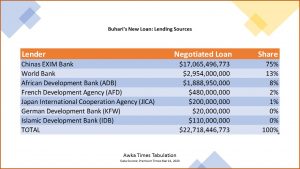 (▲Click above insert to view table in full mode)
(▲Click above insert to view table in full mode)
The foreign borrowings are tied to infrastructure and other projects approved by the lenders. Much of the lending will reportedly not be disbursed into the Nigerian treasury but will instead be released by lenders as direct project payments.
If the loan request is eventually approved by the lower house at its current level, it would occasion a vast inflation of Nigeria’s external debt stock, raising it to about $49.66 billion, an explosive 425% spike from the external loan outlay when Buhari first acceded to the presidency in 2015. This would return Nigeria to the level of loan profligacy seen under the ill-fated Second Republic, under President Shehu Shagari, when Nigeria’s external debt jumped 434% in just four years, from the $3.74 billion inherited from the military under General Olusegun Obasanjo in 1979 to about $20 billion when the Shagari government fell in December 1983.
Shared Burden, Discrepant Benefits
Astonishing as the loan expansion itself is, it is rather the plan for its deployment that is raising political hackles in parts of Nigeria. A national debt being sought ostensibly for infrastructure development has a disbursement scheme which – rather brazen for its political insensitivity – completely leaves out the South East geopolitical zone, a zone riddled with blighted or non-existent infrastructure. It is hard to understand the technocratic assessment or political calculation behind such brazen neglect.
The federal government’s plan envisages five different areas of utilization for the new loan, the major ones being infrastructure, power generation, economy, communication, social investment, and others. The largest of the proposed outlays are: the Lagos-Kano railway modernization project, spanning the South West and Northern geopolitical zones, for which $5.53 billion is earmarked; the coastal railway modernization project covering the Calabar-Port Harcourt-Onne deep sea port segment in the South South, for which $3.47 billion is being set aside; the Mambilla hydro-electric power project in Taraba State of the North East zone, assigned $4.8 billion; the nationwide support project for Micro, Small and Medium Enterprises, allocated $1.28 billion; the Abuja mass rail transit project allocated $1.25 billion; and a plethora of other proposed allocations.
The bulk of the canvassed foreign loan goes to projects in other geopolitical zones except the South East, and to nationwide projects hardly any of which impacts the neglected hinterland. Awka Times’ detailed checks show that the only mention of a specific South East disbursement relates to a paltry $50 million, accounting for 0.2% of the anticipated loan, earmarked for “vocational training in the power sector”. But this amount is to be split between Enugu and seven other states (Lagos, Ogun. Kano, Plateau, Niger, Kaduna and Cross River) as well as Abuja FCT. If, to keep it simple, we assume that the $50 million will be split evenly between the nine destinations, then, in the end, the only specific earmark for the South East zone from the jumbo loan of $22.72 billion is a laughable $5.6 million.
This means that specific South East earmark from a loan that would be repaid by all of Nigeria as a sovereign entity is only 0.02%!
Contrast the abject disregard of the South East with the following zonal allocations: North East 23%, South South 17%, North West 14%, South West 12%, North Central 8%, and Nation 25%.
(▲Click above insert to view chart in full mode)
Electoral Loss, ‘Resentful’ Boss
There is speculation that this apparent discrimination against the South East is likely the result of a promise Buhari himself made after the 2015 presidential election when he stated at a Washington DC forum that states which gave him only 5% of their votes could not expect to be treated as those that gave him 97%.
▲Buhari, in 2015, explaining his ‘5%/97%’ rule
As the map below shows, in the 2015 presidential election Buhari polled at 5% or less in all the states of the South East zone barring Imo where he notched up 19%. His principal opponent in that election – the southerner and then incumbent president Goodwill Jonathan who was running on the People’s Democratic Party (PDP) ticket – mopped up the bulk of the votes in the South East.
(▲Click above insert to view map in full mode)
In 2019 when President Buhari was seeking re-election, the competitive field had changed somewhat. This time, the PDP fielded a flagbearer considered a formidable candidate: former vice-president Atiku Abubakar who was a Northerner like Buhari. This material fact, that the two major parties both fielded Northern flagbearers, coupled with a natural political pragmatism that pulled some influential South East politicians into the ruling APC in the intervening years, led Buhari to perform much better in the South East in the 2019 presidential election. This time, he polled in the high 20s in three of the five South Eastern states (Imo, Abia and Ebony); he scored 13% in one (Enugu); and he managed to eke out 6% in the remaining state (Anambra).
(▲Click above insert to view map in full mode)
The result of the 2019 presidential poll showed that although Buhari’s favorability in the South East had noticeably improved, he was still disfavored in the geopolitical zone. He still underperformed the competing ticket even when his opponent was another Northerner, albeit one with a popular Igbo ex-governor, Peter Obi, as his running mate.
Given the above, there may be some justification to the claim that the apparent marginalization of the South East, vivified in the proposed loan issue, is evidence of political retribution being exacted by a politician against a zone that has never favored him.
Hallowed Roles, Mellowed Voices
It is unclear if this stark political reality influenced the thinking of the South East caucus in the National Assembly. Because that would be the only charitable way to explain the initial behavior of senators from this zone in the loan saga. When the loan petition was tabled for deliberation in the Senate chambers, all but a few of the 14 South East senators were reportedly absent (the 15th South East senator, Orji Uzor Kalu representing Abia North, has been incarcerated since December after he was convicted in a fraud case). As reported, there had been a heated though relatively short debate among the senators over the loan request. Apparently only a few of the South East senators who were present had contributed to the loan debate. When they did, there seemed to be some sort of psychological distancing from their constituency concerns, as in the submission by Sen. Rochas Okorocha (Imo West), who rose to speak on a different but related bill to set up a South East Development Commission:
“When we talk about the unity of Nigeria, Igbos contribute 75% on the unity of this country. But yet they are the most misunderstood people. Let me also speak with passion and appeal on THEIR behalf for the first time… I’ve risen here to speak on behalf of North Central, North West, South West and others. First time I’m speaking on behalf of the Igbos. That this feeling of neglect and marginalization by the South East needs to be corrected SOMEHOW. Of recent is a $22.7 billion that came to this nation as loan, and nothing is being traced to the South East. It’s painful. And the Igbos are BEGINNING to feel rejected, neglected in a nation THEY think they are part of. I think this great chamber should assuage THEIR fear and concern.”
▲Sen. Rochas Okorocha speaking during a Senate debate (OakTV)
In contradistinction to Sen. Okorocha’s oddly dissociative advocacy, it was most notably Sen. Enyinnaya Abaribe (Abia South) who spoke with passion, laying out a cogent case for distrbutive equity with regard to the project funding from the loan. Sen. Abaribe not only demanded more details on the geopolitical distribution of the loan, he also questioned the economic value of several line items in the borrowing plan.
However, despite Sen. Abaribe’s spirited remonstration, the loan petition still got a unanimous assent in the Senate, with reports that the South East senators joined their colleagues to approve the loan, after a closed-door session of the Senate.
It is therefore a little perplexing that the same South East senators showed up at a press conference, one week after the Senate vote approving the loan, to announce that they were “concerned” about the exclusion of the South East from loan disbursements! Presumably this new realization came about in the wake of negative media reporting and commentary after Senate approval of the request was announced.
Looking somewhat flummoxed at the press briefing that he gave with a handful of his caucus colleagues on March 12th, group leader and former deputy Senate President, Ike Ekweremadu (Enugu West), said that the South East caucus was protesting the exclusion of the region in the distribution of infrastructure projects funding from the new federal government loan. He said that the caucus had taken its protest to the Senate President, Ahmed Lawan, and the Speaker of the House, Femi Gbajabiamila.
▲Sen. Ekweremadu with SE caucus members, Mar 12, 2020 (Viable TV)
Sen. Ekweremadu told reporters that the loan request was approved by the Senate because many South East senators were out of the chamber during the debate, “attend[ing] to other important things.” He said:
“Regrettably last Thursday, the Senate passed a borrowing plan which excluded the whole of South East. We like to use this opportunity to thank some of our colleagues who were at the chamber like Enyinnaya Abaribe who made spirited efforts to get the matter addressed to see that there is equity distribution.
“Most of us were not in the chamber. I was at an INEC retreat so we want to commend [Abaribe] for what he did and those of our colleagues who were there during the conversation. We met as a caucus of legislators of the South East last night after consulting with our people and getting their feelings regarding this issue.
“If we are going to be part and parcel of the payment, it makes every sense that we are going to benefit from the utilization of those funds. Our concerns about certain facilities within the eastern corridor railway of Port Harcourt to Maiduguri, we are also concerned about the access to the sea for people of the South East to open seaports in our area. We hope by the time the matter is addressed, the fears of the people will be allayed.”
Sen. Ekweremadu said that the South East caucus “felt that the best approach was for a constructive engagement with the National Assembly leadership. So this afternoon, we had a very good conversation with both the Senate President and the Speaker of the House of Representatives.”
He said the caucus believed that the matter would be revisited because the National Assembly leadership had shown not just “concern” but “commitment”, assuring the caucus that the situation would be redressed in a way that includes the South East in loan projects.
Sen. Ekweremadu took the time to thank the Assembly leadership for its assurances. He also hoped that what was presented by the federal government “was just a plan and [that] there’s still an opportunity to look at distribution.”
Ekweremadu was asked why his caucus was acting so belatedly when the group should have been aware of the content of the federal government’s proposals before the vote. He was reminded in fact that the government’s proposals had long been in rotation since they were first presented in the Eighth Assembly in which many of the current caucus members served. The implication was that members of the South East caucus had had plenty of time to seek a recalibration of the loan disbursement plan before it was approved by the Senate, but they apparently did not.
The senator parried the question but stated that the South East still had a window through legislative processes which would be exploited to address the issue. He said since the loan request had not been approved in the House of Representatives, “the appropriate thing will be done and our people’s fears will be allayed.”
It seems possible that the evident inequity in the planned distribution of the loan would be addressed, especially with a presumably chastened caucus responding to constituency pressure. Since the issue of the loan entered the public domain, agitation has been rising among South East communities.
Beyond adverse media commentary, some individuals are taking practical steps to redress the situation. For instance, a group that goes by the name “Igbo Board of Deputies”, apparently a non-profit outfit, has been circulating material purporting to show that it had engaged attorneys to act for it on the loan issue. A letter seen by Awka Times appears to have been drafted by attorneys retained by this group and addressed to China EXIM Bank which is providing over 70% of the new loan. In the letter, the group offered data (with some inaccuracies) making the case that the South East was not benefiting from the loan. As such, the letter said, it was serving legal notice to China EXIM Bank to desist from disbursing the loan, or risk being joined in a planned suit against the federal government of Nigeria over its discrimination against the Igbos on this loan and related issues.
It is unclear what the threatened suit will accomplish, or if indeed it would be brought. But such civic society initiative is evidence of disgruntlement in the South East over its flagrant mistreatment on this loan issue. It also defies political logic that the APC government would be so cavalier and insensitive towards the South East, in the face of rising agitation, even as it is striving for further electoral inroad to the geopolitical zone. Perhaps this is the reason for the South East caucus’ optimism about the “assurances” offered by the National Assembly leadership.
Be that as it may, we cannot be entirely certain if the “assurances” are well-intended or merely communicated to mollify a disgruntled constituency. It is also uncertain what form “redress” will take: whether the South East will receive meaningful project allocation from the loan, or merely allocated a token to placate the rising discontent.
Given the uncertainty, Awka Times, in the spirit of patriotic journalism, is joining efforts aimed at redressing a situation that could further fray the fragile cohesion of Nigeria. We have put together a list of the South East members of the Nigerian Senate, publishing their phone and email information so that constituency members could contact their senators demanding that they stay the course to ensure that a meaningful and adequate solution is devised. It is necessary to redress the gratuitous discrimination against the South East zone in the utilization of a loan ostensibly secured under the sovereign remit of Nigeria.
(▲Click above insert to view table in full mode)
* Note: Sen. Orji Uzoh Kalu is currently incarcerated following conviction in a fraud case, so he may not be easily reachable at this time.

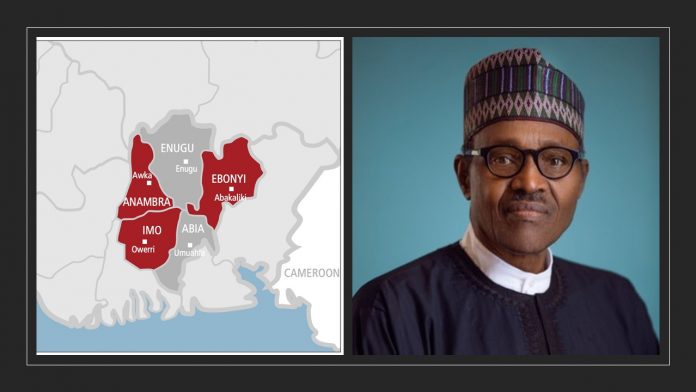
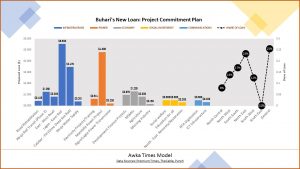
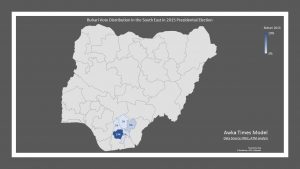
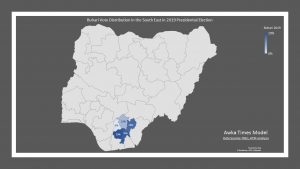
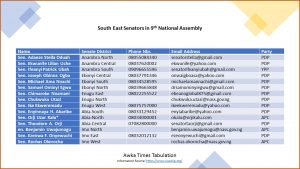


The Nigeria loan palava.
It quite unfortunate that the south eastern Nigeria is seriously lagging behind the national event of comprehensive representations of their region or rather our region. But I think this will serve a lesson of making sure we vote people who have the sound moral of good representations. Other zones has taken us for a ride so much that we begin to imagine if we don’t have credible people among us again. Thanks Awka Times magazine for this privilege.
I аm genuinely thankful to the owner of this web
page who has sharеd this іimpressive story.